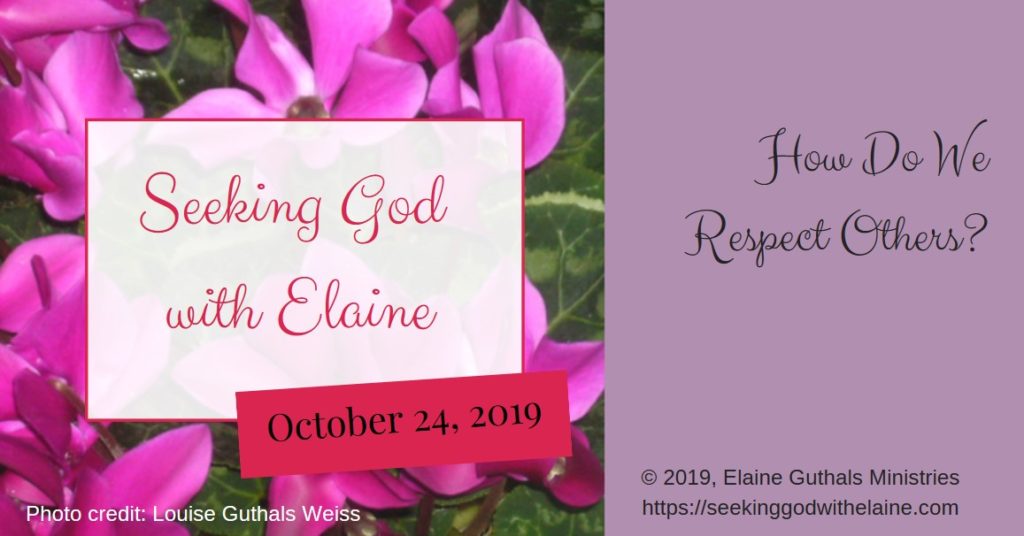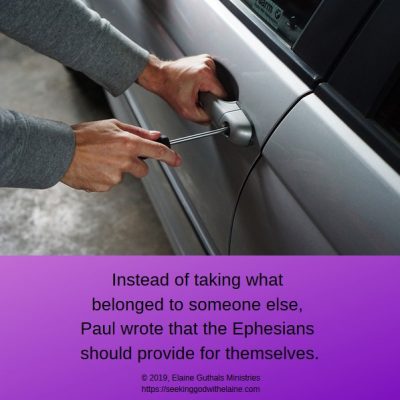In telling his Ephesian readers how they were supposed to live, Paul did an excellent job of telling his readers the opposite way of living than how they had been. This devotion sees how that way is more superior to the ways they had been living.
Nuggets
- The eighth commandment says do not steal; that was what Paul taught.
- Paul advised people to work for a living.
- The agenda Paul was suggesting went from focusing on the thief to focusing on someone else who really was in need.
- Our words do matter, because they produce actions.
- We don’t want to cause injury – even through our words – to our fellow disciples.
To read devotions in the How Are We Supposed to Live? series, click the appropriate button below.

Paul knew that, if the Ephesians – and we – were going to live different lives, those lives would have to be the opposite of the way we had been currently living. Let’s take a look.
Opposite of Stealing
“Let the thief no longer steal, but rather let him labor, doing honest work with his hands, so that he may be able to give to those in need” (Eph. 4: 28 RSV)
I wonder what Paul was thinking when he wrote Ephesians 4: 28. Yes, the eighth commandments says, “you shall not steal” (Ex. 20: 15 ESV). The problem was that many of the Ephesians lived by stealing.
Paul has a big heart. He had to have to endure all of the persecution for people to get to know their Redeemer and Sovereign God. He would have felt for his readers who would have a lifestyle change.
However, Paul was also a law and commandments guy. The eighth commandment says do not steal. That was what Paul taught.
When talking unity, Paul knew that unity would not be achieved if disciples were stealing from fellow disciples. Disciples’ trust in the thief would be damaged.
Paul advised people to work for a living. He described it as “… doing honest work with his hands …” (Eph. 4: 28 RSV).
Instead of taking what belonged to someone else, Paul wrote that the Ephesians should provide for themselves. Instead of being idle except when stealing, he said that they should labor.

But Paul didn’t stop there. He went on to say “… so that he may be able to give to those in need” (Eph. 4: 28 RSV).
Wow! Paul turned the whole agenda. It went from focusing on the thief to focusing on someone else who really was in need.
Opposite of Cut Down
“Let no evil talk come out of your mouths, but only such as is good for edifying, as fits the occasion, that it may impart grace to those who hear” (Eph. 4: 29 RSV)
It is so easy these days to cut people down. Yes, some of it is done in jest. Unfortunately, much of it today is people who think they have the right to rip up one side and down the other on someone who has a different opinion than theirs.
David knew our mouths get us in trouble. In Psalm 141: 3, he said, “Set a guard over my mouth, Lord; keep watch over the door of my lips” (NIV). Can’t you see that image in your head — an angel standing guard right by lips.
There is good reason to want a guard. “But no one can tame the tongue; it is a restless evil and full of deadly poison” (Jas. 3: 8 NASB). We can’t do it ourselves.

Sometimes, we may think our words don’t matter. They do matter, because they produce actions. Remember in the last devotion, we talked about conflict and anger. The genesis of those could have been by something someone said.
To read a related devotion, click the appropriate button below.
Paul knew what he was talking about when he said, “Let no evil talk come out of your mouths …” (Eph. 4: 29 RSV). Again, he suggested the opposite: “… but only such as is good for edifying, as fits the occasion …” (Eph. 4: 29 RSV).
The old saying is so wrong. Words do harm. They can elicit emotions that can just bubble over and take situations to places we never intended
Listen to Hawk Nelson’s song Words. It follows what Paul says.
Remember, we are talking about unity of the early church in Ephesus. If they would have splintered, things would have been much different today.
We don’t want to cause injury – even through our words – to our fellow disciples. Remember, “Owe nothing to anyone—except for your obligation to love one another …” (Rom. 13: 8 NLT) includes loving other disciples.
But the opposite of cutdown is build up. We are called to be encouragers. “Therefore encourage one another and build one another up, just as you are doing” (I Thess. 5: 11 ESV). We are to bear each other’s burdens (Gal. 6: 2), not alienate them.
Making the Connections
Did you get the idea that Paul wasn’t suggesting that the end result of the work would be to hoard wealth? It was so that others who couldn’t work were supported.
It speaks to the belief that all we have is given to us by God. “You, Lord, are all I have, and you give me all I need; my future is in your hands. 6 How wonderful are your gifts to me; how good they are!” (Ps. 16: 5-6 GNT). We are to use what we have to His glory and honor.
When you think about it, that was the mindset of the early church. “All the believers were one in heart and mind. No one claimed that any of their possessions was their own, but they shared everything they had. … And God’s grace was so powerfully at work in them all that there were no needy persons among them. For from time to time those who owned land or houses sold them, brought the money from the sales and put it at the apostles’ feet, and it was distributed to anyone who had need” (Ac. 4: 32-35 NIV).
It worked because people were willing to do their part. They were unified in their goals (there is that word again). Whether they had a little or a lot, they considered it God’s, not theirs.
Because they were unified and giving, God blessed them. They had put Him and others first.
They had to put others first when it came to the words they used. That happens easier when we are truly putting God above all.
How Do We Apply This?
Isn’t respect what this is really about? We have to recognize their worth as people. We have to appreciate similarities and differences.
No, that does not mean we have to tolerate their sin. We have to lovingly show them their need to admit their sins, believe on Jesus as Redeemer, and confess God as Sovereign Lord. Then they have to demonstrate that commitment by working to change their lifestyle more align with God’s laws and commandments.
We need to measure our words. I know that is hard when we are living in a world trying to move faster than the speed of sound. I think we have to learn the art of conducting a conversation again. Let me clarify that — face-to-face conversation. The internet has its benefits (I am talking to you, right?).
But I think we have lost some of the skill sets needed to carry on a conversation and resolve issues right there while we are looking the person in the eye. I think accountability has been taken away.
I think we’ve lost the art of staying silent. It seems to me that we have gotten to a point where we are more likely to respond— and not well — to something that triggers us. We’ve got to get the sound of silence back.
We need to make sure we speak God, not ourselves. We want to expand His kingdom, not glorify ourselves. When we think on Him and meditate on Him, His words are going to come out of our mouths.
We have a resource at our hands that I don’t think we tap into enough to help us with our conversations. We have the grace of God.
What did Paul say? “assuming that you have heard of the stewardship of God’s grace that was given to me for you” (Eph. 3: 2 RSV). God gives us grace to pass on to others.
Grace is a free and unmerited gift from Heavenly Father given through His Son, Jesus Christ that enables salvation and spiritual healing to believers. Because of God’s infinite grace, He devised the plan of salvation that made Jesus our Redeemer in order to forgive us of our sins.
That is what God’s grace is. In a nutshell, it is where He provided more than we deserved. We can exhibit that to others.
We also need to take a lesson out of God’s mercy book. Mercy is the unexpected way God responds in love to our needs. It is where He didn’t judge us to the extent He could have. We can do that, too.
Paul said something else. “I therefore, a prisoner for the Lord, beg you to lead a life worthy of the calling to which you have been called, with all lowliness and meekness, with patience, forbearing one another in love, eager to maintain the unity of the Spirit in the bond of peace” (Eph. 4: 1-3 RSV emphasis added).
Let’s chase a rabbit a second by looking at the fruits of the spirit: “… love, joy, peace, patience, kindness, goodness, faith, gentleness, self-control” (Gal. 5: 22-23 HCSB emphasis added). Paul mention almost half of the fruits. That is how we are supposed to live.
Unfortunately, we aren’t fruit-of-the-spirit perfect. When we mess up, we need to ask forgiveness — from God and from others.
Hopefully, we won’t steal. We know our words will hurt others. There will be times we put ourselves before others.
We have to keep shooting for the perfection God wants from us. We can only do that with His guidance.
Loving Father. Our relationships with others would go so much better if we would respect them. Instead, this world wants to tear us apart because of the differences. Help us to use our words wisely and lovingly. Use us to guide them to You. May we never compromise what You want us to be to fit into this world. Amen.
What do you think?
Leave me a comment below (about this or anything else) or head over to my Facebook group for some interactive discussion.
If you don’t understand something and would like further clarification, please contact me.
If you have not signed up for the email daily or weekly providing the link to the devotions and the newsletter, do so below.
If God has used this devotion to speak with you, consider sharing it on social media.
Pingback: How Do We Grieve the Spirit? – Seeking God with Elaine
Pingback: Be Careful of Other’s Words – Seeking God with Elaine
Pingback: How Are We Sealed? – Seeking God with Elaine
Pingback: A To Do List for Life – Seeking God with Elaine